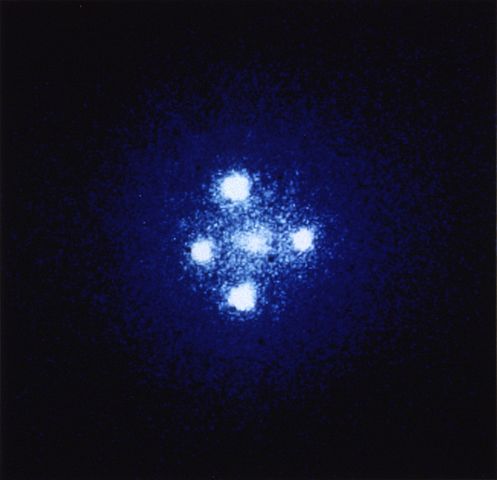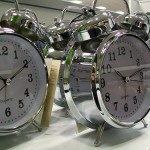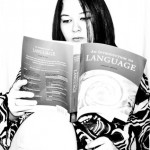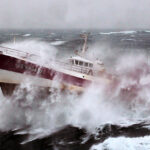Equipped with his five senses, man explores the universe around him and calls the adventure Science. – Edwin Hubble

The Hubble Telescope provides this image of a gravity lens imagined by the mind of Einstein, and through the power of technology, can now be observed with our own eyes. What a powerful combination our brains and senses are!
What does that mean?
This quote is interesting to me as it demonstrates the two parts of Science. There is that which we can detect, measure, and experience with our senses, and that which we cannot. Often, as technology progresses, science which was abstract becomes apparent to our senses.
This quote is about the first half of the dichotomy of Science, those things we can detect, measure, and experience with our five senses. The implication is that we use our minds and the methods of science to give meaning to what we experience.
We humans are curious beings, and seem to delight in finding new ways to look at old data. Eventually, we find ways to observe theories, and then have to make adjustments to the theories. We continuously use the Scientific Method as our guiding method for analyzing and interpreting what we find.
Why is using our minds to analyze the input important?
Superstitions are explored with the same five senses which are used by those exploring Science. Even when given identical information, the two camps often come to vastly different conclusions. What separates Science from superstitions is how we approach the data our senses relay to our brains.
Superstition isn’t deterministic. If you showed sufficiently advanced technology to groups of non-tech people, you’d get a different explanation from each. Show the same item to anyone using the Scientific Method and you will get nearly identical responses, provided they have the tools and education to properly analyze the technology.
Consider the legends, stories, and fables surrounding Hubble’s favorite science, the stars. How many cultures had superstitions about their formation and function? The answer is all of them, until the last few centuries. With the advent Scientific Method and advancing technology, our minds are taking us to new heights of science.
Where can I apply this in my life?
While the quote is specifically about the tangible exploration of Science, I find the theoretical aspect to be the next step, and far more interesting. The ability of our minds to look at data and theorize what happened is one of the more interesting things we do.
As an example, Albert Einstein was able to come up with a theory about gravity and it’s ability to interact with light. Later, an interesting quasar was found. What was theory, something which was formed and existed only in his mind, suddenly became observable with our eyes.
His mind wasn’t typical, and he approached problems from a slightly different viewpoint. But that’s fine, we all do things a little differently. But we can all use the most excellent combination of our senses and our minds. Solving problems scientifically is something we already do.
Imagine you came home to find a broken window. Inside was a baseball. You remember seeing some neighborhood kids playing baseball a few days ago. How long would it take you to figure this out, using simple logic and basic science? Not very long, right?
That’s because you already know how to do it, you just haven’t thought of your actions in this manner before. If you were paying really close attention, you might be able to tell what direction the ball came from by locating where the window broke and where the ball came to rest.
You might even deduce how fast it was going by determining how far into the room the ball went. But now we’re getting into CSI or Sherlock Holmes territory. But you can see how a combination of our senses, simple science in this case trajectories and momentum), and our brains solve science problems?
Even something as simple as calculating a parabola is done by anyone who throws a ball of any kind. Jump shots, pitchers, quarterbacks all do it in their heads. Some people use their feet, be it in soccer or the kicker in American Football. Our senses, coupled with our minds are a powerful combination.
As we look deeper into science, we approach the limits of our technology. But there’s no reason to stop thinking just because our minds have outstripped our senses, even with technological enhancements. We keep on thinking. We keep on solving problems, extrapolating from known data.
We think and solve problems, both scientific and not, every day. We use our senses to gather data, and we use our minds to both come to our conclusions and to consider how to implement them. That’s the same thing Scientists do each day. Welcome to the club!
It’s been said, “There are two kinds of people in the world. Those who can use their mind to extrapolate incomplete data sets…”
“…and those who can’t.” (Included for completeness of the thought. 8)
From: Twitter, @ScienceChannel
confirmed at : http://www.brainyquote.com/quotes/quotes/e/edwinpowel172280.html
Photo by NASA and the Hubble Space Telescope (how fitting)
Happy Birthday to Edwin Hubble, noted astronomer, born 20 November, 1889.






